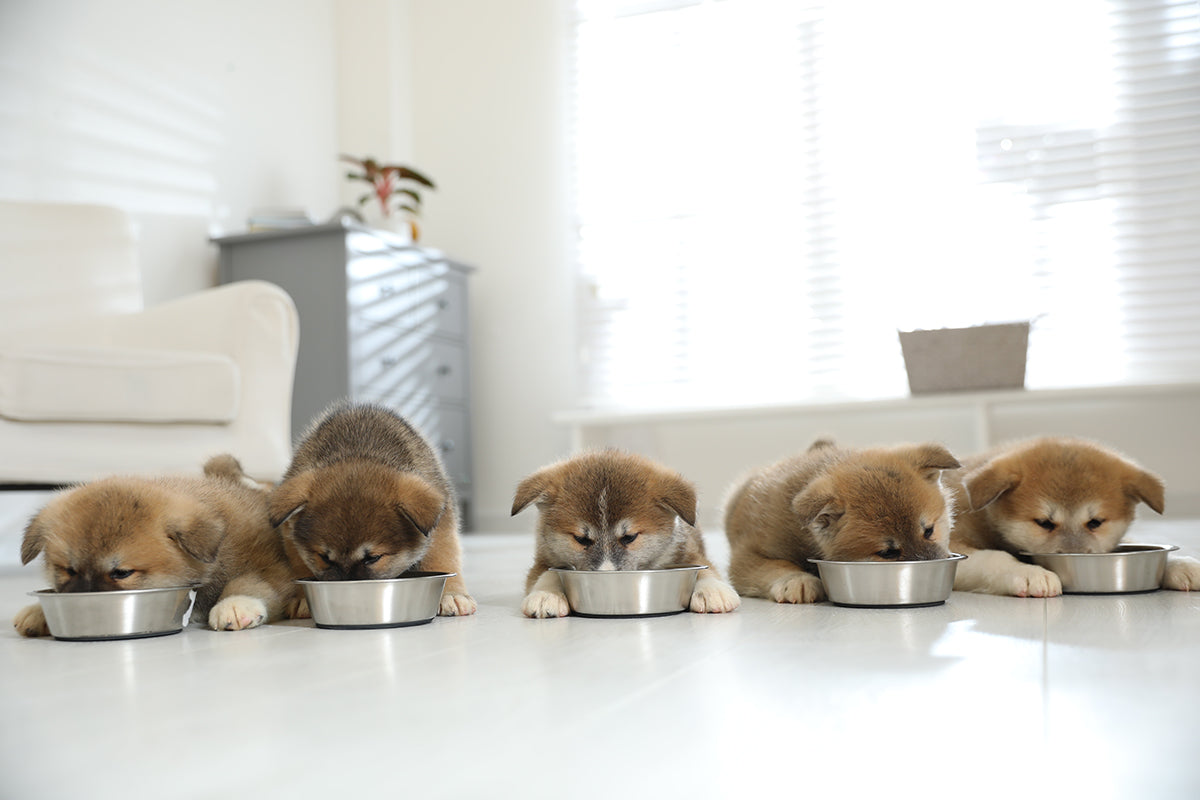
How much should you feed an 8-week-old puppy?
Puppies hit a few major life milestones when they're eight weeks old. Their brains are developing fast, but they're still small and fragile. They're fully weaned, losing a few baby teeth, but not yet teething. Making sure you feed them right is vital during this vulnerable stage.

So just how much should you feed an eight-week-old puppy? The most important factors to consider are your puppy's breed, projected size as an adult, and activity levels.
Make Sure You Feed Puppy-Formula Food
When feeding your puppy, skip the adult dog food and only use food specially formulated for growing puppies. Puppies need more nutrients and calories than adult dogs because they grow so fast. Feeding your puppy adult dog food can put their health at risk.
Dry kibble for puppies is a good choice because it's healthy for the gums and teeth. However, it can be dehydrating. For some puppies, you might consider mixing in a little wet food, a little warm water, or unsalted broth.
You also want to provide an attractive source of water to help encourage your puppy to stay hydrated, and we've got three great options for you to consider:
- K&H CleanFlow Filtered Water Bowl with Reservoir: Filters water through charcoal to remove impurities.

- K&H Coolin' Bowl - Cooling Water Bowl for Pets: Keeps water fresh and cold for up to 15 hours without electricity.

- K&H Thermal-Bowl Heated Outdoor Water Bowl: Prevents water from freezing when the temperatures drop in the winter.

Consider Your Puppy's Size and Breed
The most important factors in determining how much to feed your puppy are his breed and projected size as an adult. Smaller breeds are at greater risk of low blood sugar, so they need to eat smaller meals more frequently. Larger breeds need more calories overall each day to keep up with their growth.
While feeding guidelines vary, one way to estimate how much to feed your eight-week-old puppy is based on his approximate weight as an adult. Divide the total recommended daily amount from the puppy food packaging into the number of meals per day to determine the amount you're feeding each meal.
Remember, the feeding instructions on the puppy food packaging are just guidelines. Check with your veterinarian for the specific feeding amounts and times for your new puppy. Your veterinarian will consider the brand of food, whether it's dry or wet, and your puppy's activity level when making a specific recommendation.
If you're more concerned about calories, the recommended daily amount will also vary depending on your puppy's breed, size, and activity level. The Merck Veterinary Manual provides an online calorie calculator that factors in your dog's age and how many calories are in each cup of food to give you an estimate. But you still need your veterinarian's input on whether that estimate should be lower or higher based on your puppy's breed and other factors.
Schedule Meals as Part of Your Puppy's Routine
Routines are important for puppies. So schedule your puppy's meals as part of her regular daily activities. For example, you might feed your puppy right before you go outside to play every day. If you're out in the winter, keep a heated outdoor bed nearby so your puppy has a toasty place to relax, like the K&H Deluxe Lectro-Soft Outdoor Heated Bed.
Generally, puppies that eat three times a day are fed in the morning, afternoon, and evening. So breakfast can take place right after you get up, lunch can go along with an afternoon walk, and dinner can be timed alongside an after-work walk or play session. For puppies that need four meals a day, you might schedule the last meal just before bedtime or whenever is most convenient for both of you.
Your puppy's bedtime routine should include a snuggly place to get cozy and feel secure. Your pup would love these at night:
- K&H Mother's Heartbeat Puppy/Kitty Heart Pillow: The pillow's heartbeat rhythm mimics the heartbeat of your puppy's mom, from small breeds to large.

- K&H Mother's Heartbeat Puppy Crate Pad: This soft microfleece pad holds a heartbeat device that comfortingly mimics the heartbeat of your puppy's mom.

- K&H Thermo-Snuggly Sleeper Heated Dog Bed: This super cozy bed warms up to your dog's body temperature when in use.

8-Week-Old Puppies Need Special Diets
When puppies are eight weeks old, they need food made specifically for puppies, and they need three to four meals a day, depending on their breed. The extra calories will help keep them healthy as they play and go through their growth spurts. If you have any questions, talk to your veterinarian about what's best for your little fur ball.
